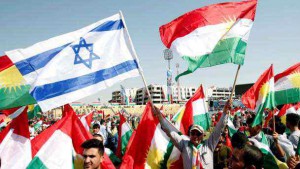Tense, divisive or controversial ‘referendums’ seem to be the in-thing right now.
Presently, a lot of coverage has been given to two independence referendums in different parts of the globe: one in Spain and one in Iraq.
Both referendums also have things in common.
Regarding the Catalonian independence referendum in Spain, I have no personal views on whether Catalonian independence is a good idea or not.
However, the apparent extent of the Spannish government’s attemps to derail, discourage or vilify the vote has reinforced my original suspicions some weeks ago that the apparent Barcelona terrorist attack (vehicle attack) wasn’t what it appeared to be – and may in fact have been a Deep State or Gladio style operation to intimidate Catalonians ahead of the vote and also to provide a pretext for sending armed military or police into the region ahead of the impending vote.
I know that this is a suspicion held by some in Barcelona. My original article on that matter is here: however, what I find most interesting about this is that it provides a very useful demonstration of how, when and why false-flag/gladio terrorism is employed by various governments as psychological warfare against the general public.
That terror attack – attributed to a group of Morroccans – acted as a violent warning to Catalonians to ditch any ideas about independence or even a referendum; and the events of the last few days have shown just how seriously the Spannish federal government takes the idea of Catalonian independence and how much it wants to nip any such thoughts in the bud.
The federal government declared the referendum illegal and deployed national police to suppress the vote, intimidate voters and even forcefully shut down voting locations and confiscate voting materials.
In extraordinary scenes for Western Europe, hundreds of people – more than 800, according to official reports – were injured in violent clashes as police in riot gear fired rubber bullets into crowds of people and, in some instances, voters were attacked with batons. All of this over a vote.
Weeks ago, when I said Barcelona was a state-sponsored false-flag attack, it was just a theory – in light of recent days, I can quite comfortably elevate that to fact.
________________
Moving onto the Kurdistan independence referendum, there is plenty of reason to be suspicious – even if we might be generally sympathetic to the idea of Kurdish independence or statehood.
Personally, I tend to be morally in favor of some form of Kurdish independence, as I have highlighted before.
And I think the British and French should’ve afforded the Kurds a sovereign state back when they were callously carving up the Middle East after World War I (the British had in fact promised the Kurds such a state and broken that promise, just as they had broken their promises to the pro-British Hashemite Arabs at the same time).
However, as happens often in geo-politics, you might be morally sympathetic to a particular cause or idea and yet, at the same time, deeply suspicious about how or why it is being played out the way that it is.
Anyone familiar with the Zionist ‘Yinon Plan’ or the related Neo-Con ‘Clean Break’ strategy of Balkanising Middle-Eastern countries into smaller, sectarian (and perpetually feuding) states will have little choice but to view the Kurdish independence push in Iraq as part of that plan. On some level, I wish this wasn’t a factor – as, having suffered oppression in multiple countries and by multiple regimes, there’s no question that the case for some form of Kurdish statehood is valid and, moreover, that the general desire for a Kurdish state pre-dates any alleged Zionist strategy and goes back for generations.
However, given that multiple countries’ governments are opposed to the Kurdish referendum (and had warned against it) and given fears of even further sectarian conflict being triggered in the region, an objective perspective – rather than an ideaological one – is probably wisest.
There are fears that any near-future attempt by Iraqi Kurds to secede and form their own state (particularly involving the oil-rich Kirkuk region) could trigger another civil war in the Middle East – which is precisely why multiple governments (and the UN) had warned against the referendum.
Thierry Meysan, writing at Voltaire, refers to the vote as ‘a fool’s game’. His article, which covers much of the otherwise veiled recent history and background to this project, is something I highly recommend reading.
Can the push for Iraqi Kurdistan be viewed as separate from Israeli foreign policy?
The truthful answer is yes, it can: but also that it is, unfortunately, very difficult to do so.
Even without referencing the Yinon Plan or alleged Greater Israel project and even putting aside Israel’s longstanding support for a Kurdish state (which isn’t suspect in itself – Israel has every right to want a potentially sympathetic state in the region), even the evidence of just recent weeks is highly suggestive.
Images from last week’s events appear to show Israeli flags being waved along with Kurdish flags.

Emmanuel Nahshon, an Israeli Foreign Ministry Spokesman, recently reffered to an independent Kurdish state as being “like a second Israel” in the Middle East. On the one hand, there’s a surface-level or benign way to read that – which is the idea of another potentially secular democracy in the region; which would be a good thing.
On the other hand, it was clear from Nahshon’s other statements that he was envisioning a strategic ally/base for expanded conflict with neighbouring states.
Moreover, it is reported elsewhere that Benjamin Netanyahu and Massoud Barzani, the unofficial ‘President’ of the independent Kurdistan, have reached a secret agreement and that there are plans to install some 200,000 Israelis (of Kurdish origin) into what would be Iraqi Kurdistan.
In fact, the father of Massoud Barzani, was a Mossad asset and ally.
Mullah Mustafa Barzani’s work with Mossad goes back many decades to when David Ben-Gurion was Israeli Prime Minister.
An Israeli involvement in the Iraqi Kurdish situation is therefore probable, to say the least.
This in itself is not necessarily a bad thing.
After all, there are no ‘Good Guys’ and ‘Bad Guys’ anymore in any of this. If Israel is seeking to prop up the Kurds in Iraq, bear in mind that Iraqi ‘sovereignty’ has been meaninglesss since the illegal US-led invasion; the Iraqi government is now essentially an Iranian vassal, aside from the territories that were seized by ‘ISIS’, who were themselves illegitimate.

Everyone in the region – Saudi Arabia, Iran, Qatar, the US, Turkey, and yes, Israel – has its hands all over the place, trying to prop up its own best interests.
In that paradigm, it might be fair to argue that Israel has as much ‘right’ to prop up its own interests in Iraq as Iran has to run the Iraqi government or to send Shia militias into Syria. No one is minding their own business or respecting sovereignty – the Iraq War ended all of that.
The problem is when we look beyond a simple agenda (to prop up a prospective ally or symathetic neighbour) and look at the possible implementation of a broader, more bloody agenda.
There has certainly been a strong argument for many years that US Neo-Con policy to invade Iraq and remove the secular dictatorship of Saddam Hussein had originated in part from the ‘Clean Break’ strategy, which itself was a reboot or – at the very least – a more or less identical strategy to the Yinon Plan.
The breaking down of Iraq into sectarian divide and bloodshed – primarily Sunnis and Shias, but also Kurds – played out directly from this blueprint; as did the War in Syria – Iraq’s neighbour and another secular state dragged into sectarian division and bloodshed.
Indeed, US and Israeli policy up until very recently was to advocate the dividing of Syria into smaller, ethno states – a partitioned Syria along sectarian lines, and of which a Kurdish state (within Syria) was supposed to be a key part.
A former NATO Supreme Commander wrote an article to this effect last year for Foreign Policy, for example. This division of Syria policy was put forward to look like a logical response to the violence and warfare in Syria; however, it should be remembered that the plans to Balkanise Syria and the Middle East pre-dated the 2011 onset of the Syria War by a number of years.
It is possible that, with the Assad presidency surviving and the Syrian state being supported by Russia, decisions have instead been made to focus on Iraq again and to seek to play out the stategy there (there’s also a possibility that an independent Kurdish state in what is now Iraq could some day seek to merge with a prospective independent Kurdish state in Syria, which could be used to force a Syria partition).
Of course, having the referendum doesn’t guarantee, by any means, the actualisation of an independent Kurdish state in what is currently Iraq.
But the fact that it went ahead, even with the numerous, across-the-board calls for it to be either cancelled or postponed, is suggestive of an agenda or intention being taken very seriously.
The sectarian nightmare that the Neo-Con invasion of Iraq unleashed in both that country and the region (pitting Sunnis against Shias, with Kurds caught in the mess) may have been to service the Yinon/Clean-Break agenda and begin the process of splitting those countries into smaller, ethno-states.
Kurdish communities in the region – including Iraqi Kurds – do have legitimate reasons to want independence. Even the mufti of Iraq’s Sunni community has said that the Iran-backed Shia government of Iraq has oppressed the Kurds. The Kurds in fact have been oppressed and abused by both the pre Iraq War Sunni state and the post Iraq War Shia government. It is hardly surprising that independence would be sought.
And, objectively speaking, most of those resisting the idea of Kurdish independence or this referendum are the same powers or people who’ve long been invested in keeping the Kurds down. So you can hardly blame them for pushing ahead with a referendum.
That doesn’t mean, however, that there aren’t other forces or agenda in play, seeking to use prospective Kurdish independence for reasons other than simply the best interests of Kurdish people.
_______________
Interestingly, both the referendum in Catalonia and the referendum in Iraq have things in common – despite being so unrelated.
In both cases, the referendum went ahead against the explicit wishes or demands of the national government. In both cases, international parties have appeared to oppose it: and in both cases, these were non-binding and arguably illegal referendums. Also, in both cases, the prospective areas that would theoretically become independent contain valuable resources and economic value that the national governments are unwilling to see taken out of their hands by any newly-declared state.
It is a little bit ironic, however, that it was in Spain and not in Iraq that overt state violence and suppression was employed against the people to suppress the vote.
Read more: ‘Catalonian Independence and the Barcelona Terror Attack‘, ‘The Kurds and the Betrayal of Repeating History‘, ‘Aleppo, Syria, Libya & the Survival of Bashar Assad‘…





Excellent commentary, as always. And all I can say is ‘what a colossal mess.’